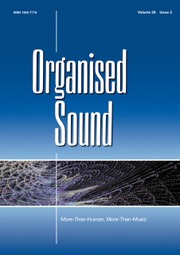Article contents
Evaluating Digital Games for Competitive Music Composition
Published online by Cambridge University Press: 04 March 2020
Abstract
Digital games are a fertile ground for exploring novel computer music applications. While the lineage of game-based compositional praxis long precedes the advent of digital computers, it flourishes now in a rich landscape of music-making apps, sound toys and playful installations that provide access to music creation through game-like interaction. Characterising these systems is the pervasive avoidance of a competitive game framework, reflecting an underlying assumption that notions of conflict and challenge are somewhat antithetical to musical creativity. As a result, the interplay between competitive gameplay and musical creativity is seldom explored. This article reports on a comparative user evaluation of two original games that frame interactive music composition as a human–computer competition. The games employ contrasting designs so that their juxtaposition can address the following research question: how are player perceptions of musical creativity shaped in competitive game environments? Significant differences were found in system usability, and also creativity and ownership of musical outcomes. The user study indicates that a high degree of musical control is widely preferred despite an apparent cost to general usability. It further reveals that players have diverse criteria for ‘games’ which can dramatically influence their perceptions of musical creativity, control and ownership. These findings offer new insights for the design of future game-based composition systems, and reflect more broadly on the complex relationship between musical creativity, games and competition.
- Type
- Articles
- Information
- Copyright
- © Cambridge University Press, 2020
References
REFERENCES
GAMES AND MEDIA
- 7
- Cited by



